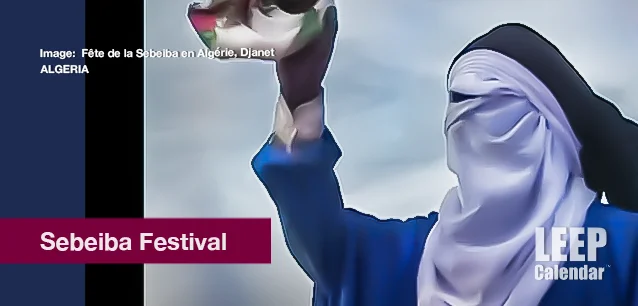 AD
AD
Today is: December 24
Scroll to explore events active on this date.
LEEP INK FEATURES

August? Absolutely!
In August, we live through the Dog Days of Summer. It's hot and often humid, and those who can leave for better climates do. Down south, winter is in full force. August is also known as "the ...

In The Heat of July: July 2025 Events
Is it hot enough (or cold enough if you're below the equator) for you yet? There is actually a day for that! Like every month, I pick a diverse collection of events you may or may not know about. This ...

May Blooms: Events in May 2025
Along with October, May is one of the most densely packed months of the year. It's before the summer humidity and the last whole month of the school year. The weather is warming in t...
About the Sebeiba Festival in Algeria
Politics , Legal
Rallies & Protests , United States
Ends: Aug 07, 2023
DESCRIPTION:
The Sebeiba festival, an enchanting tradition rooted in the heart of Djanet, an oasis town in the Tassili N'Ajjer National Park of southeastern Algeria, is a vibrant expression of the region's cultural heritage. This 3,000-year-old annual ten-day festival is a cornerstone of the Tuareg community's social and cultural life. In 2014, the festival became a UNESCO Intangible Cultural Heritage of Humanity event. It begins on the full day of Ashura, an Islamic holiday, and concludes after ten days.
Originating from a historic peace agreement between rival Tuareg tribes centuries ago, the festival celebrates peace and unity. It commences with a solemn ritual called "Takaraket," symbolizing the end of hostilities and the beginning of the festivities.
The heart of Sebeiba lies in its dramatic reenactments of ancient battles. Participants, dressed in traditional indigo robes and brandishing handmade swords and shields, engage in mock fights, showcasing their equestrian skills and martial prowess. This symbolic warfare is a reminder of the past struggles and the value of the peace they now cherish.
Music and dance are integral to the festival. The "Tinde," a rhythmic beat produced by women using mortar and pestle, accompanied by melodic chants, creates a mesmerizing ambiance. Men perform the "Tahaggart," a dance characterized by slow, deliberate movements, reflecting the stoic nature of the Tuareg people.
Throughout Sebeiba, there's a vibrant display of Tuareg crafts and cuisine. Artisans showcase their skills in silverwork, leatherwork, and textile weaving. At the same time, traditional dishes like "Taguella," a type of flatbread, and "Eghajira," a hearty soup, are savored by participants and visitors alike.
The festival also serves as a social nexus, fostering community bonds and providing a platform for young people to learn about their heritage. Including modern elements, such as soccer matches and camel races, adds a contemporary twist to this ancient festival, ensuring its relevance and appeal to younger generations.
As the festival concludes with a day of rest and reflection, participants don their finest attire and gather to share stories, reinforcing the bonds of friendship and community. The Sebeiba festival not only preserves the rich cultural legacy of the Tuareg people but also symbolizes their resilience and unity in the face of historical adversities.
VIDEOS
SUPPORTING DOCUMENTS
Currently, this event does not have supporting documents.
ADDITIONAL IMAGES
Currently, this event does not have supporting images.
Where would you like to go now?
 AD
AD


/footer-logo.svg)
